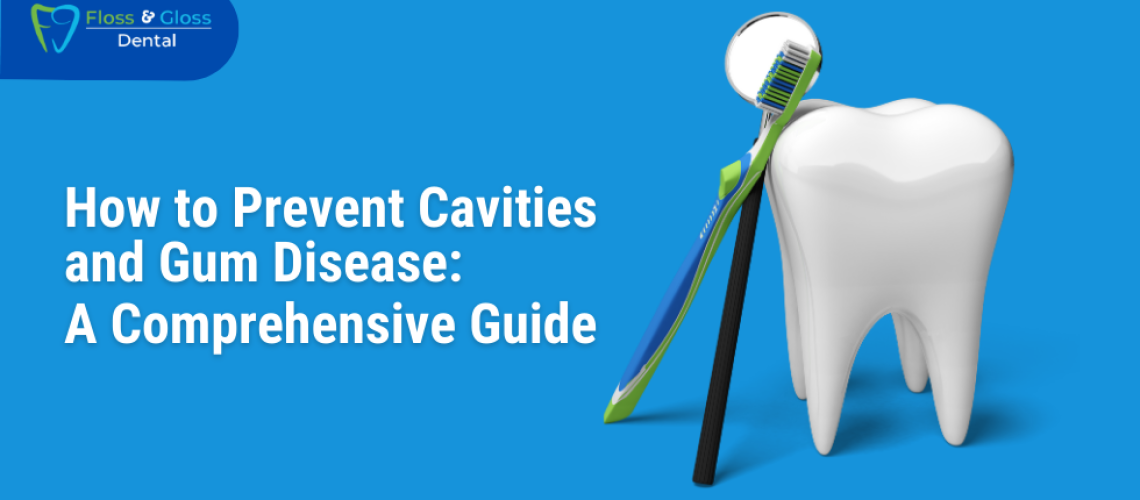Cavities and gum disease are two of the most common dental problems that affect millions of people around the world. They can cause pain, discomfort, infection, tooth loss, and even affect your overall health. Fortunately, they are also preventable with proper oral hygiene and dental care. In this article, we will share with you some of the best tips on how to prevent cavities and gum disease and keep your smile bright and beautiful.
What are Cavities and Gum Disease?
Cavities, also known as dental caries, are holes or damage in the enamel of your teeth caused by bacteria. Bacteria feed on the sugars and starches in the food and drinks that you consume and produce acids that erode the enamel. Over time, this can lead to cavities that can expose the inner layers of your teeth and cause sensitivity, pain, and infection.
Gum disease, also known as periodontal disease, is an inflammation and infection of the gums and the supporting tissues of your teeth. It is caused by the buildup of plaque, a sticky film of bacteria, on your teeth and gums. If plaque is not removed regularly, it can harden into tartar, which can only be removed by a dentist. Plaque and tartar can irritate and inflame your gums, causing them to bleed, swell, and recede.
This can create pockets between your teeth and gums, where more bacteria can accumulate and cause further damage. Gum disease can range from mild gingivitis to severe periodontitis, which can result in tooth loss and bone loss.
How to Prevent Cavities and Gum Disease
The good news is that cavities and gum disease can be prevented with some simple and effective steps. Here are some of the best practices for oral hygiene and dental care that you should follow to prevent cavities and gum disease:
1. Brush Your Teeth
Brush your teeth at least twice a day, preferably after every meal, with fluoride toothpaste and a soft-bristled toothbrush. Brush for at least two minutes, covering all surfaces of your teeth and gently massaging your gums. Replace your toothbrush every three to four months or when the bristles are worn out.
2. Floss Your Teeth
Floss your teeth at least once a day, preferably before bedtime, to remove plaque and food particles from between your teeth and under your gumline. Use a gentle sawing motion and curve the floss around each tooth. Do not snap the floss or force it into your gums, as this can cause bleeding and damage.
3. Rinse Your mouth
Rinse your mouth with an antibacterial mouthwash or a fluoride rinse after brushing and flossing to kill any remaining bacteria and strengthen your enamel. Follow the instructions on the label and do not swallow the rinse. You can also rinse your mouth with water after eating or drinking anything acidic or sugary to neutralize the acids and wash away the residues.
4. Visit your dentist
Visit your dentist regularly, at least twice a year, for a professional cleaning and checkup. Your dentist can remove any plaque and tartar that you may have missed and detect and treat any signs of cavities and gum disease before they become worse. Your dentist can also provide you with preventive treatments such as sealants, fluoride, and scaling and root planing, depending on your needs and risk factors.
5. Eat a balanced and nutritious diet
Eat a balanced and nutritious diet that is low in sugar and starch and high in fiber, vitamins, and minerals. Avoid or limit foods and drinks that can damage your teeth and gums, such as candy, soda, juice, coffee, tea, wine, and citrus fruits. Instead, choose foods and drinks that can benefit your oral health, such as cheese, yogurt, milk, water, green tea, apples, carrots, celery, and nuts. These foods and drinks can help neutralize acids, stimulate saliva, clean your teeth, and provide calcium and other nutrients for your enamel and bones.
6. Drink plenty of water
Drink plenty of water throughout the day to keep your mouth hydrated and wash away any food particles and bacteria. Water also helps prevent dry mouth, which can increase your risk of cavities and gum disease. Dry mouth can be caused by certain medications, medical conditions, smoking, and alcohol. If you suffer from dry mouth, you can use sugar-free gum, lozenges, or sprays to stimulate saliva and moisten your mouth.
7. Quit smoking or using tobacco products
Quit smoking or using tobacco products, as they can stain your teeth, damage your gums, and increase your risk of oral cancer. Smoking and tobacco can also interfere with the healing of your gums and the effectiveness of your dental treatments. If you need help to quit, you can consult your doctor, dentist, or a support group for advice and resources.
8. Manage your stress levels
Manage your stress levels, as stress can affect your immune system and make you more prone to infections and inflammation. Stress can also cause you to clench or grind your teeth, which can wear down your enamel and damage your jaw. To reduce stress, you can try relaxation techniques, exercise, meditation, hobbies, or counseling.
Conclusion
Cavities and gum disease are serious dental problems that can affect your oral and overall health. However, they can be prevented with proper oral hygiene and dental care. By following these tips, you can protect your teeth and gums from bacteria and plaque and enjoy a healthy and beautiful smile. Remember to brush, floss, rinse, visit your dentist, eat well, drink water, quit smoking, and manage stress. Your oral health is in your hands, so take good care of it!

